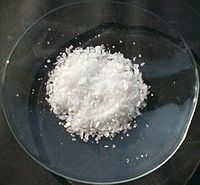
Photo from wikipedia
As an important part of the acid fracturing process of carbonate reservoir, the performance of acid fracturing working fluid directly affects the stimulation effect of oil wells. In this paper,… Click to show full abstract
As an important part of the acid fracturing process of carbonate reservoir, the performance of acid fracturing working fluid directly affects the stimulation effect of oil wells. In this paper, formaldehyde (agent A) and ammonium chloride (agent B) were used as the matrix. Several aldehydes with different volume ratios were prepared. The acid ratio with the highest acid yield was selected by the sodium hydroxide titration experiment. The results show that when the volume ratio of agent A to agent B is 1:1.3, the acid production capacity is the strongest. The pH values at several time points in the process of acid reaction were measured by a pen pH meter. The relationship curve between acid production capacity and time was obtained. The acid production capacity increased with time. It tends to be stable after a certain time. The experiment of acid rock reaction kinetics shows that the reaction rate between acid and rock decreases with the extension of time. The reaction time can reach 6 h. The reaction rate of autogenic acid under different temperatures and concentrations ranges from 6.61 × 10–7 to 9.49 × 10–7 mol/(s·cm2) within 6 h. Therefore, it indicates that the reaction time between autogenic acid and carbonate rock is long and the reaction rate is low. It is beneficial to improve the acid treatment effect of the carbonate reservoir. The conductivity experiments show that at different temperatures, with the increase of sealing pressure, the etching ability of autogenic acid decreases. The etching effect is better at 338 K. After etching, the permeability and conductivity of the rock slab of 5 MPa closure pressure are 227 D and 72.62 D·cm, respectively. To sum up, this autogenic acid is an effective working fluid in the acid fracturing process of the carbonate reservoir. It can obviously reduce the reaction rate of acid rock and has certain conductivity.
Journal Title: ACS Omega
Year Published: 2022
Link to full text (if available)
Share on Social Media: Sign Up to like & get
recommendations!